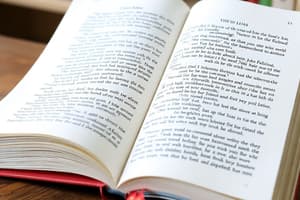Podcast
Questions and Answers
How can a questioning attitude improve your reading comprehension?
How can a questioning attitude improve your reading comprehension?
It helps you connect the reading to what you already know.
What are secondary sources?
What are secondary sources?
Other writers' interpretations of original documents.
Determining your purpose for reading helps you to do all EXCEPT which of the following?
Determining your purpose for reading helps you to do all EXCEPT which of the following?
- Identify key themes
- Find the answers more quickly (correct)
- Understand the context better
- Take better notes
What is NOT part of determining an effective setting for focused reading?
What is NOT part of determining an effective setting for focused reading?
What are ways to increase your concentration when studying?
What are ways to increase your concentration when studying?
Which of the following is NOT an organizing theme found in the social sciences and humanities?
Which of the following is NOT an organizing theme found in the social sciences and humanities?
When studying math, you should?
When studying math, you should?
You’re reading an online report concerning the leading causes of climate change. Which of the following would suggest that the evidence supporting the author's position is unreliable?
You’re reading an online report concerning the leading causes of climate change. Which of the following would suggest that the evidence supporting the author's position is unreliable?
What is the purpose of surveying before reading a chapter?
What is the purpose of surveying before reading a chapter?
Which is NOT a way to use your dictionary to increase vocabulary?
Which is NOT a way to use your dictionary to increase vocabulary?
When is the most effective time to recite information from your reading?
When is the most effective time to recite information from your reading?
What are critical readers known for?
What are critical readers known for?
Differentiating between reading for pleasure and reading for information involves thinking on which level of Bloom's Taxonomy?
Differentiating between reading for pleasure and reading for information involves thinking on which level of Bloom's Taxonomy?
What is required to locate information in electronic library databases?
What is required to locate information in electronic library databases?
Which of the following would be BEST to highlight as you read your textbook?
Which of the following would be BEST to highlight as you read your textbook?
Flashcards are hidden until you start studying
Study Notes
Reading Comprehension and Purpose
- A questioning attitude enhances comprehension by linking new information to prior knowledge.
- Knowing your reading purpose aids in swift answer retrieval during studying.
Sources and Interpretation
- Secondary sources consist of other writers' interpretations of original documents, offering different perspectives.
Effective Study Habits
- To boost concentration, structure study time effectively and limit technology distractions.
- Recognizing ineffective study settings is crucial; for instance, studying in the evening may not be optimal for focused reading.
Mathematics Study Strategies
- Understanding the underlying principles of formulas is essential when studying mathematics for effective problem-solving.
Evaluating Evidence
- Unreliable evidence in reports may stem from biased sources, such as studies funded by automobile manufacturers regarding climate change.
Pre-Reading Techniques
- Surveying a chapter before reading helps identify main ideas and themes, providing a framework for understanding.
Vocabulary Building
- Utilizing a dictionary enhances vocabulary, while analyzing spelling is not a recommended method for improvement.
Recitation and Critical Reading
- The best time to recite learned information is immediately after reading the relevant text section to reinforce retention.
- Critical readers analyze statements for accuracy, relevance, and logical coherence, ensuring comprehensive understanding.
Cognitive Skills in Reading
- Differentiating between reading purposes, such as pleasure versus information gathering, engages analysis at Blooms Taxonomy's higher levels.
Information Retrieval
- Effectively locating information in electronic databases requires the strategic use of keywords to enhance search efficiency.
Textbook Reading Techniques
- Highlighting key terms and concepts while reading a textbook is crucial for emphasizing important information and improving retention.
Studying That Suits You
Use AI to generate personalized quizzes and flashcards to suit your learning preferences.




